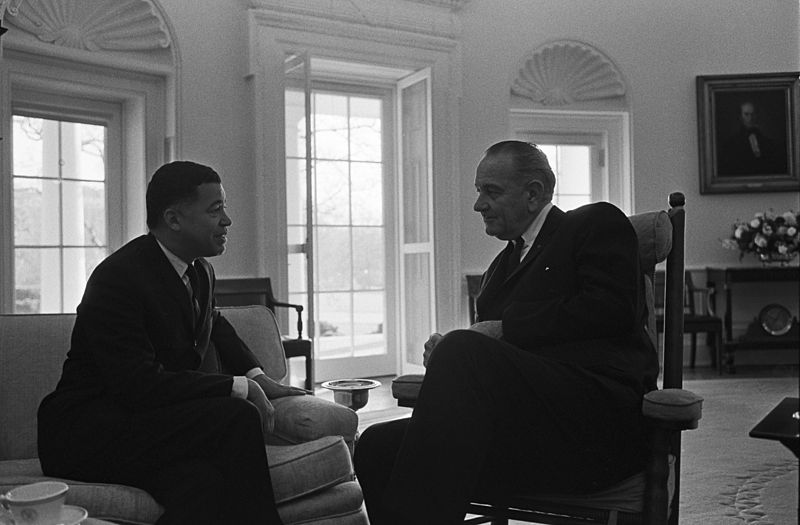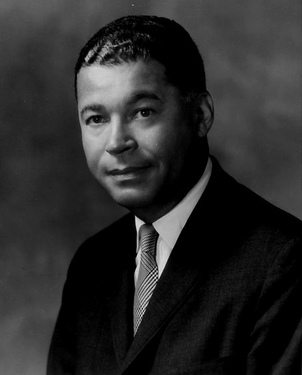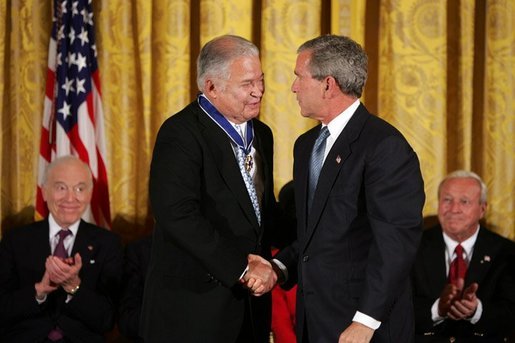The Bold Strokes of Edward Brooke
Edward William Brooke III was born in Washington, District of Columbia on October 26, 1919 to Edward William Brooke, Jr., a lawyer with the Veteran’s Administration, and Helen Brooke. He grew up in the middle-class section of the city and attended Dunbar High School, which was one of the most prestigious academic high schools for African Americans. Brooke later attended his father’s alma mater, Howard University, with the intention of pursuing a career in medicine. However, he developed an interest in sociology and graduated with a bachelor’s degree in 1941.
Following the Japanese bombing of Pearl Harbor on December 7, 1941, Brooke, like many of his fellow Americans, enlisted in the U.S. Army to fight in World War II, becoming a second lieutenant. Prior to his going abroad, he was stationed at the 366th Infantry Regiment, a segregated military base at Fort Devens in Ayer, Massachusetts. However, Brooke saw the irony in the situation: how was he going to war in the name of democracy when racial discrimination was still so rampant in his own country?
Brooke later reflected about that time, saying, “In every regard, we were treated as second-class soldiers, if not worse, and we were angry. I felt personal frustration and bitterness I had not known before in my life.” Brooke’s anger fueled his desire for change and, despite his lack of legal training, he soon was known as the “soldier’s lawyer,” becoming a popular defender of black enlisted men in military court. He eventually was deployed to Italy, spending 195 days with his unit and establishing himself as an important American asset due to his fluency in Italian and light skin color, which allowed him to sneak across enemy lines. During his service, he earned the rank of captain as well as a Bronze Star and the Distinguished Service Award from the U.S. Military. Brooke also met his first wife, Remigia Ferrari-Scacco, who was Italian, while he was there. They maintained a long-distance relationship for two years after he returned in 1945, marrying on June 7, 1947 in Roxbury, Massachusetts.
Following his return to the United States, Brooke, still passionate about civil service and public defense, focused his attention on his education. He earned a Bachelor of Laws in 1948 (the precursor to the J.D.) and Masters of Laws in 1949 from Boston University. Despite offers to join established law firms, Brooke chose to open his own in Roxbury, a predominantly African-American community. In 1950, at the urging of a close friend from the military, Brooke was launched onto the political stage, running for a seat in the Massachusetts House of Representatives. However, his lack of overall political experience and clear party affiliation cost him the election. Two years later, this time with endorsement from the Republican Party, Brooks once again entered the election and won the Republican nomination, but fell short against his Democratic opponent.
Brooke then decided to take a hiatus from politics, choosing to focus on his legal practice. During this time, he established numerous relationships within his community that would ultimately prove useful in future elections. In a0 bid for Massachusetts Secretary of State in 1960, he once again lost. However, Brooke gained name recognition and popularity. Governor John Volpe of Massachusetts recognized this and appointed Brooke as chairman of the Boston Finance Commission, which was charged with rooting out corruption and financial malfeasance in the municipal government. During his two-year tenure, Brooke succeeded in transforming the stagnant organization into an effective, dynamic force in Boston. He was known for having “the tenacity of a terrier” and restoring honor to a crumbling institution.
Drawing upon that success, Brooke returned to politics in 1962 running for Attorney General of Massachusetts. He won as a Republican and became the first African-American to serve in that position in any state—bringing him national attention. In this post he continued to fight corruption and organized crime, along with protecting consumers’ rights, and battling housing discrimination. Still, he was a moderate in many ways; for example, refusing to throw his support behind a 1964 black boycott against segregation in the Boston school system. However, in taking that stance he secured his popularity with many white voters in the state.
In 1966, he ran for a U.S. Senate seat, having to go up against former Governor Endicott Peabody. He campaigned to work for, “the establishment of peace, the preservation of freedom for all who desire it, and a better life for people at home and abroad.” He continued to stake a moderate position, criticizing militant civil rights groups (along with staunch segregationists) and describing himself as a “creative Republican.” On November 8th he was elected with 62 percent of the vote, becoming the first African-American congressman in 85 years and the very first to be elected by winning the popular vote (during Reconstruction when the last African-American Senators were elected, they were chosen by state legislatures).
Upon arriving in the Senate on opening day, Brooke received a standing ovation from his colleagues. Unlike his peers in the House, he did not experience racism, later recalling that, “In all my years in the Senate, I never encountered an overt act of hostility.” Brooke gained support from both parties. He also refused to become a voice solely for African-Americans, maintaining his desire to be a voice for all Americans. However, he was appointed in 1967 to President Lyndon B. Johnson’s Commission on Civil Disorders, to investigate the causes of recent rioting in major cities and propose solutions for the racial unrest. The commission’s report, released in 1968, sold over two million copies. It found that blacks were frustrated with the lack of economic opportunity, also noting the failed housing, education and social-service policies of the government. One month after the release of the report, rioting broke out in more than 100 cities nationwide following the assassination of Martin Luther King, Jr. Shortly thereafter, Brooke suggested in the Senate that King’s birthday, January 15th, should be made a national holiday.
During his tenure, Brooke often went against his party and reached across the aisle to get things done. He was instrumental in enacting such legislation as the 1968 Fair Housing Act, which prohibits discrimination
in housing and created the Office of Fair Housing and Equal Opportunity to enforce the provisions. He was also vocal about his opposition to the Nixon administration’s attempts to close down the Job Corps, Office of Economic Opportunity, and the Equal Employment Opportunity Commission—all parts of President Johnson’s Great Society legislation. He also organized support to defeat two of Nixon’s Supreme Court nominations during their Senate confirmations. Despite these battles, Brooke was repeatedly speculated as a potential Vice Presidential candidate for Nixon, but was never appointed as such. In fact, he was the first Senator to call upon Nixon to resign in response to the Watergate scandal.
Brooke also helped pass the Equal Credit Act, which ensured women the right to establish credit in their own name, and worked to retain Title IX, which guarantees equal educational opportunity and athletic participation to girls and women. He also contended in an extended debate with Senator John Stennis of Mississippi over the extension and expansion of the Voting Rights Act–winning his colleagues over to support his position.
In 1976, Brooke voiced his advocacy for legalized abortion. This was particularly important because he served on the Senate Appropriations Committee whose Department of Health and Human Services Bill determines funding for Medicaid. However, the pro-life movement was eventually successful in restricting Medicaid funding. Within Massachusetts, this caused his Catholic support to dwindle on account of his stance on abortion. Additionally, he went through a nasty public divorce resulting in allegations of financial misconduct that were investigated by the Senate and prosecutors (future Senator John Kerry among them).
While he was not charged, he was found to have made false statements and lost even more support, eventually losing his re-election campaign to Paul Tsongas in 1978. The combined magnitude of these events—the loss of the election and his divorce—marked the end of Brooke’s political career. Following that, he resumed practicing law in Washington. He also held a variety of positions, such as chairman of the board of the National Low Income Housing Coalition and chairman of the Boston Bank of Commerce. As part of an investigation into the Department of Housing and Urban Development, a former assistant said Brooke had lied in response to questions about whether he or his staff had tried to influence HUD officials on behalf of housing and real estate developers. However, the investigation did not result in any charges being brought.
In 2002, Brooke announced that he had been diagnosed with breast cancer, at which point he became a national spokesperson for increased breast cancer awareness among men. To mark the end of his long and illustrious career, President George W. Bush awarded Brooke with the Presidential Medal of Freedom in 2004, recognizing Brooke’s contribution to the nation with its highest civilian honor. Four years later, Barbara Walters alleged that she and Brooke had engaged in an affair that lasted throughout the 1970s, while Brooke was still married to his first wife. The following year, he was awarded the Congressional Gold Medal. Brooke passed away on January 3, 2015 at his home in Coral Gables, Florida at the age of 95.
Throughout his life, Edward Brooke worked hard to make a meaningful difference not for one particular group of Americans, but for all Americans. As he once said, “I am not a civil rights leader, and I don’t profess to be one.” He had a keen ability to negotiate and incite change, as well as to bring people together to work for the common good. First and foremost, he was always true to himself, regardless of whether it meant going against his party or popularity. Perhaps his legacy can be best summarized in his own words: “I have always tried to believe what I said and say what I believe and I still do that.”



